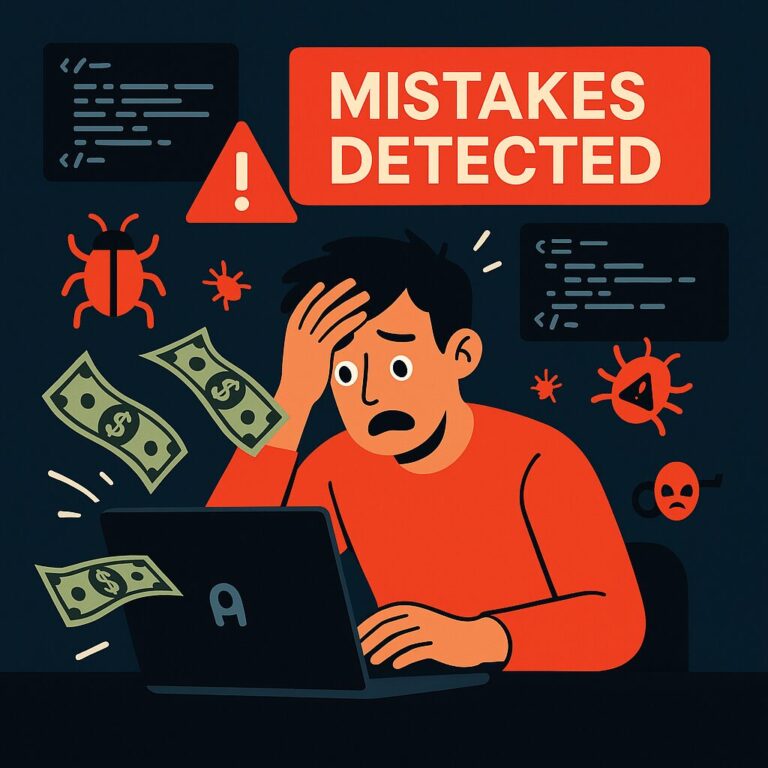
The Dark Side of Tech Certifications: When They Hurt Your Career | Dev Tech Insights
Tech certifications promise a shortcut to six-figure salaries and job security—but what if they’re secretly sabotaging your career?
While certs like AWS, Google Cloud, or CISSP can open doors, stacking too many (or the wrong ones) can make you look desperate, inexperienced, or even unhireable.
Need Fast Hosting? I Use Hostinger Business
This site runs on the Business Hosting Plan. It handles high traffic, includes NVMe storage, and makes my pages load instantly.
Get Up to 75% Off Hostinger →⚡ 30-Day Money-Back Guarantee
In this post, we’ll expose:
When certifications hurt more than help (with real hiring manager confessions).
The 5 types of devs who should avoid certs.
What to focus on instead to stand out in 2025.
The Certification Gold Rush: Why Everyone’s Obsessed
Certifications exploded because:
✅ Employers demand them (even when irrelevant).
✅ Bootcamps push them (as “guaranteed job tickets”).
✅ Imposter syndrome fuels them (“Maybe one more cert will make me legit”).
But here’s the problem:
“Certifications measure what you memorized, not what you can do.”
5 Ways Certifications Can Backfire (With Real Stories)
1. The “Paper Tiger” Effect
What happens: You have 10 certs but can’t debug basic code.
Hiring manager quote:
“I auto-reject resumes with more than 3 certs—it screams ‘no real experience’.”
2. The “Wrong Cert” Penalty
Example: A front-end dev with Cisco CCNA (irrelevant networking cert).
Result: Recruiters assume you’re unfocused or misaligned.
3. The “Overqualified Junior” Trap
Story: A junior dev earned AWS Solutions Architect Pro but got rejected for entry-level roles.
Why: Employers feared he’d leave for a senior job ASAP.
4. The “Cert Collector” Stigma
LinkedIn profile red flag:
“AWS Certified, Google Cloud Certified, Azure Certified, CompTIA A+, Scrum Master, CISSP…”
Perception: “This person tests well but might lack hands-on skills.”
5. The “Outdated Cert” Problem
Fact: Most certs expire in 2–3 years (but stay on resumes for 5+).
Risk: Advertising obsolete knowledge (e.g., Python 2.7 certs in 2025).
When Certifications Actually Help (And When They Don’t)
✅ When They Help:
Breaking into the industry (e.g., Comptia A+ for IT support).
Government/contract jobs (mandatory for compliance).
Niche fields (e.g., cybersecurity certs like CISSP).
❌ When They’re Useless (or Harmful):
For senior roles (experience > exams).
In fast-changing fields (e.g., AI/ML certs outdated in months).
If you lack projects/experience (certs can’t compensate).
Useful Links
- Reality of Serverless: Pros, Costs, Security, and Trade-offs
- Human Programmer Wins Against OpenAI in Tokyo—What This Means for AI Developers
- 🧠 The 7 AI Coding Mistakes That Are Costing You Time, Money & Rankings (2025 Edition)
- Don’t Learn These Tech Skills in 2025 (Unless You Want to Stay Broke)
- Web Performance Lies We Still Believe (And What to Do Instead in 2025)
- Tech Predictions vs Reality: What Actually Happened by 2025?
The Hidden Biases: How Hiring Managers Really View Certs
Anonymous survey of 50 tech hiring managers revealed:
68% ignore certs unless required.
22% see too many certs as a red flag.
10% value certs (mostly in cyber/cloud).
“I’d rather hire a dev with one GitHub project than five AWS certs.”
—Engineering Lead at a FAANG company
What to Do Instead of Stacking Certs
1. Build a “Proof of Work” Portfolio
Example: Replace “AWS Certified” with “Scaled cloud infrastructure for 10k+ users”.
2. Contribute to Open Source
Why: A merged PR on GitHub > any cert.
3. Specialize in High-Demand Niches
2025’s cert-proof skills:
AI prompt engineering
LLM fine-tuning
DevSecOps automation
4. Get “Stealth Certifications”
How: Use credentialed projects like:
“Built a real-time fraud detection system (validated by Stripe’s engineering team).”
5. Network Strategically
Fact: 80% of jobs come from referrals (certs rarely matter here).
Frequently Asked Questions
Are cloud certifications (AWS/Azure) still worth it?
A: Only if you’re new to cloud roles or need them for compliance. Senior cloud engineers rarely list certs.
Should I remove old certs from my resume?
A: Yes—if they’re expired or irrelevant (e.g., a Java dev with a 2015 Cisco CCNA).
Do certs help freelancers?
A: Only for niche clients (e.g., govt contracts). Most care about portfolio + testimonials.
What’s the most overrated cert in 2025?
A: Scrum Master (CSM)—often seen as a “checkbox cert” with low ROI.
Can certs ever make up for a lack of degree?
A: Sometimes (e.g., Google IT Cert for help desk roles), but projects trump both.
Conclusion
Certifications aren’t evil—but mindlessly collecting them is. In 2025, skills > exams.
Before your next cert ask:
Will this actually get me hired?
Could I spend this time building something instead?

🚀 Let's Build Something Amazing Together
Hi, I'm Abdul Rehman Khan, founder of Dev Tech Insights & Dark Tech Insights. I specialize in turning ideas into fast, scalable, and modern web solutions. From startups to enterprises, I've helped teams launch products that grow.
- ⚡ Frontend Development (HTML, CSS, JavaScript)
- 📱 MVP Development (from idea to launch)
- 📱 Mobile & Web Apps (React, Next.js, Node.js)
- 📊 Streamlit Dashboards & AI Tools
- 🔍 SEO & Web Performance Optimization
- 🛠️ Custom WordPress & Plugin Development








